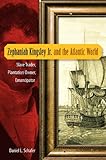Zephaniah Kingsley Jr. and the Atlantic World : Slave Trader, Plantation Owner, Emancipator.
Material type: TextPublisher: Gainesville : University Press of Florida, 2013Copyright date: ©2013Description: 1 online resource (352 pages)Content type: text Media type: computer Carrier type: online resourceISBN: 9780813048529Subject(s): Kingsley family | Kingsley, Z. -- (Zephaniah), -- 1765-1843 | Slave trade -- United States -- History | Slavery -- FloridaGenre/Form: Electronic books.Additional physical formats: Print version:: Zephaniah Kingsley Jr. and the Atlantic World : Slave Trader, Plantation Owner, EmancipatorDDC classification: 975.904092 LOC classification: E445.F6.S33 2013ebOnline resources: Click to View
TextPublisher: Gainesville : University Press of Florida, 2013Copyright date: ©2013Description: 1 online resource (352 pages)Content type: text Media type: computer Carrier type: online resourceISBN: 9780813048529Subject(s): Kingsley family | Kingsley, Z. -- (Zephaniah), -- 1765-1843 | Slave trade -- United States -- History | Slavery -- FloridaGenre/Form: Electronic books.Additional physical formats: Print version:: Zephaniah Kingsley Jr. and the Atlantic World : Slave Trader, Plantation Owner, EmancipatorDDC classification: 975.904092 LOC classification: E445.F6.S33 2013ebOnline resources: Click to View Cover -- Title -- Copyright -- Contents -- List of Illustrations -- Preface and Acknowledgments -- Introduction -- 1. The Kingsley Family, Charleston, and the American Revolution -- 2. New Brunswick Years: Becoming an Atlantic Trader -- 3. "My Saddle Bags Loaded with Specie": Caribbean Commerce in the Age of Revolution -- 4. Shifting Loyalties: St. Thomas and the Transit Trade in African Slaves -- 5. "Fortune Is Neither to Be Won by Prudence nor Industry": A Slaving Voyage to East Africa -- 6. Family Ties: Anna Madgigine Jai Kingsley -- 7. Laurel Grove Plantation, Slavery, and East Florida's Booming Economy -- 8. "Left by the Patriots a Perfect Desert": The Patriot War in East Florida -- 9. "Like a Turtle without a Shell": Spain's Final Years in East Florida -- 10. "Discreetly Restrained under the Patriarchal System": Life and Labor at Kingsley's Plantations -- 11. "The Door of Liberty Is Open to Every Slave Who Can Find the Means of Purchasing Himself ": From Spanish to American Race Relations -- 12. "In Trust for Flora Hanahan Kingsley and Her Son Charles": Kingsley as Patriarch -- 13. The "Island of Liberty" and Kingsley's Final Journeys -- 14. "To Do Good in This World We Must Have Money": The Kingsley Legacy -- Appendices -- Appendix A: Forty-five Slaves Lost, July 1812, at Laurel Grove and Drayton Island -- Appendix B: Inventory of Zephaniah Kingsley's Estate at San Jose Plantation, March 13, 1844 -- Appendix C: Slaves Claimed by George Kingsley from the Estate of Zephaniah Kingsley Jr. -- Appendix D: Slaves Recovered by Anna Kingsley from the Estate of Zephaniah Kingsley Jr. -- Appendix E: Account of Sales of Property, Sold at Auction, January 1, 1847 -- Appendix F: Inventory of the Real and Personal Estate of George Kingsley -- Appendix G: Account of the Sale of the Personal Estate of George Kingsley, February 1, 1848 -- Notes.
Bibliography -- Index -- A -- B -- C -- D -- E -- F -- G -- H -- I -- J -- K -- L -- M -- N -- O -- P -- Q -- R -- S -- T -- U -- V -- W -- Y -- Z.
Zephaniah Kingsley is best known for his Fort George Island plantation in Duval County, Florida, now a National Park Service site, and for his 1828 pamphlet, A Treatise on the Patriarchal System of Society, that advocated just and human treatment of slaves, liberal emancipation policies, and granting rights to free persons of color. Paradoxically, his fortune came from the purchase, sale, and labor of enslaved Africans. In this penetrating biography, Daniel Schafer vividly chronicles Kingsley's evolving thoughts on race and slavery, exploring his business practices and his private life. Kingsley fathered children by several enslaved women, then freed and lived with them in a unique mixed-race family. One of the women--the only one he acknowledged as his "wife" though they were never formally married--was Anta Madgigine Ndiaye (Anna Kingsley), a member of the Senegalese royal family, who was captured in a slave raid and purchased by Kingsley in Havana, Cuba. A ship captain, Caribbean merchant, and Atlantic slave trader during the perilous years of international warfare following the French Revolution, Kingsley sought protection under neutral flags, changing allegiance from Britain to the United States, Denmark, and Spain. Later, when the American acquisition of Florida brought rigid race and slavery policies that endangered the freedom of Kingsley's mixed-race family, he responded by moving his "wives" and children to a settlement in Haiti he established for free persons of color. Kingsley's assertion that color should not be a "badge of degradation" made him unusual in the early Republic; his unique life is revealed in this fascinating reminder of the deep connections between Europe, the Caribbean, and the young United States.
Description based on publisher supplied metadata and other sources.
Electronic reproduction. Ann Arbor, Michigan : ProQuest Ebook Central, 2018. Available via World Wide Web. Access may be limited to ProQuest Ebook Central affiliated libraries.

There are no comments on this title.